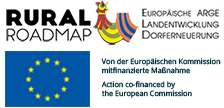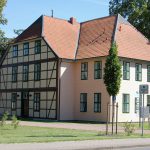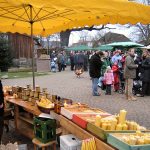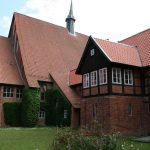Eicklingen and Wienhausen, Lower Saxony, Germany
The municipalities of Eicklingen and Weinhausen have 7,500 inhabitants and are part of the total municipality Flotwedel in the rural district of Celle.
After the „Working Group for Village and Rural Areas at the University of Hanover“, with large participation by the citizens, had compiled a development study and guidelines for individual themes in 1993 both municipalities were accepted into the village renewal programme of the state of Lower Saxony in 1997. Afterwards regional working groups defined the guidelines more exactly and brought them to life with project ideas and the first measures. The result: a socio-cultural village renewal planning in Flotwedel with a “cross-village development planning of the municipalities Eicklingen and Weinhausen” as a “concept for regional action”.
The result of these processes are several innovative and path breaking lighthouse projects. Thus especially a decentralised sewage circulation concept and the identification of a new construction area that complies with ecological requirements and regional construction methods and materials lead to the municipality Wienhausen being chosen as Expo Village 2000 which further stimulated the development process.
It is therefore of no surprise that they were brave enough not only to de-mount a rural four post half-timbered house and re-build it in Bockelskamp-Flackenhorst as a village community house but also to make it a trend-setting project of monument conservation conversion with a low energy construction.
The renovation and change in function of the historical municipal building in Eicklingen to the “Lower Saxony Information and Competence Centre for the Rural Area”, in conjunction with an entrepreneur centre for new companies is another good example of successful co-operation of the village community with experts and testifies to an empathetic and contemporary renovation of old buildings. There is high awareness of the significance of the impressive stands of trees and old farms and outhouses and great creativity is available to give them new uses.
The cornerstones of a tourism concept produced by the students of the University Lunenburg have been integrated into the village renewal process and should lead to an improvement and added value in the existing tourist potential as for example in the monastery Wienhausen that attracts two million visitors a year. By converting several buildings into a hotel – in conjunction with external partners – the immediate vicinity of the monastery has received a trend-setting function. Also included is the creation of a weekly village market that contributes to an improved marketing of regional products.
A children’s playground built by the inhabitants themselves, the restoration of the “Kannenbank”, the construction of a barbecue hut and the renovation of the village fountain are just a few examples of the high personal contribution of the population, and are witness to a functioning village community and an intact club life.
The municipalities Eicklingen and Wienhausen exhibit an intact village community that have created a future with good quality individual projects coupled with the eagerness of the village inhabitants to work. The decentralised sewage circulation project particularly stands out as an especially innovative contribution along with many successful renovations and re-functioning of old buildings.
Evaluated: 2008





